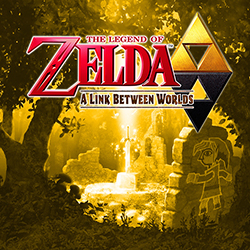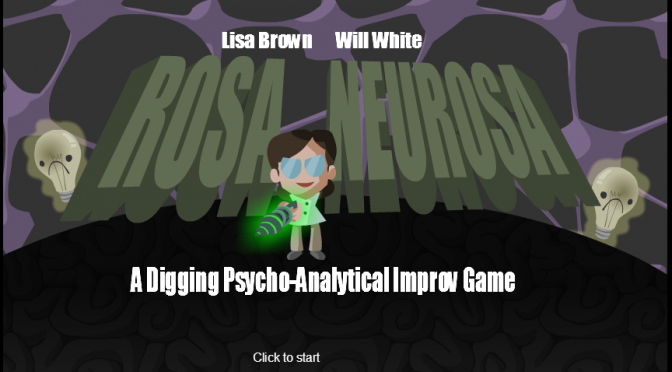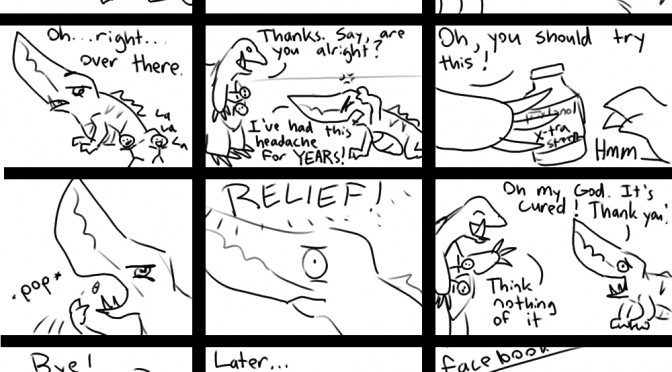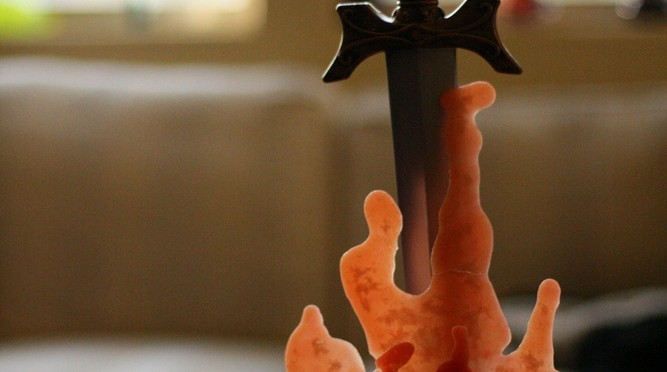This past weekend I partook in my second Ludum Dare, and my first one as part of a jam team. I had great fun working with my good friend, Will White. It’s been ages since we collaborated on anything, so it was a blast to meld creative minds once again (fun fact, Will was one of my team members on my very first game jam ever).
Category Archives: Games and Game Development
Thoughts on games and game development
How I got into games: on delayed artistic expression
Just a warning, this post is long, and jumps wildly from tales of pre-industry Lisa to silly kaiju comics. Just roll with it.
Continue reading How I got into games: on delayed artistic expression
Procedural Death Jam 2014
So I participated in Procedural Death Jam this year. Having never made a procedural game before I figured it would be a good opportunity. It was pretty fun and I was happy with my results, you can play Prop Hell here if you want to give it a try!
I wanted to go through some of my favorite entries from the Jam in no particular order. My criteria for a favorite was a game that I kept playing to the end or over and over because I found it really compelling, versus an entry I just played until I “got it.” Do note: there were many PDJ entries that I couldn’t run due to corrupted zips or executables that just wouldn’t work, but I tried my best to play as many as possible.
On Game Ideas
So, I keep a list of my game ideas as they pop up, like you do, and make sure to go back and comb through the list every now and then. Sometimes they are very much centered around mechanics, but sometimes they are very vague thoughts or phrases that I wanted to hang on to in case they would make a good game.
Often I forget what spawned these ideas. Some of them I can only remember writing down after waking up from a dream, and have since lost all memory for the context in which it relates to being a game at all. Here’s a few for your consumption:
“Ciao Ciao Ciao/Chow Chow Chow (Maybe Chow Chow Ciao?)”
“Janus loses his contacts in one face. You can only see behind you.”
“Notary Bear”
If anyone wants to make those into a game, please feel free. I have more ideas on that list than I’ll ever be able to create in a lifetime. Just let me know what you come up with because I’ll be super curious!
Lisa’s Favorite Games of 2013
And now the games post as promised. Keep in mind, this isn’t “Games I thought were the best out of all games of 2013,” because I did not play all the games. I thought Antichamber was brilliant, but I only spectated that one. And these aren’t necessarily the artsiest-fartsiest of games, or the games with the best design. Rather, this is more of a list of “Games that consumed me in 2013,” or games that was antsy to get off work and get home so I could play some more. Here they are in order played.
Ni No Kuni: Wrath of the White Witch
This game ended up being exactly what I hoped it would be. It had that whimsical, wondrous JRPG-from-my-childhood feel that I have been missing for so long, and I was startled to realize that a lot of that feeling merely comes from the presence of a world map. It was beautiful, and a world that I wanted to spend time in. I didn’t really get into the monster-collecting aspect of it, and stuck with a core group and strategy for the better part of the game, led by MonGod, the tankiest of tanks. I loved the combat in this game, which was active while still retaining something of that menu-based combat feel that I loved in JRPGs of old. If not for Nick’s fatigue of coaching boss battles, I would have plowed through all the post-end-of-game quests. I will do any quest that is framed as helping someone out, so the frequent-buyer style stamp cards were incredibly compelling for me. I wanted to help ALL THE PEOPLE.
Guacamelee
I had seen this game at Indiecade the year prior, and it won me over instantly with its aesthetic and the fact that you can transform from luchador to chicken. This is a fantastic metroid-vania style brawler, and the art and animation is delightful. The theming was spot on and the music did that weird mariachi-electronica mashup that just worked so well for the game. It had some ups and downs in co-op: the brawling was a great 2-player experience, but the exploring and platforming aspects felt better in single player. I loved how many elegant design solutions showed up, especially for combining get-to-new-places abilities with specific combat needs (the different colored shields). Also you can transform into a chicken. The only bummer in this game for me was the tired old damsel-in-distress trope. I kept waiting for them to throw a clever twist on it, but they never did 🙁 Alas, can’t have everything.
Animal Crossing: New Leaf
It had been a long, long time since I bought a console specifically for a single game, but the indirect peer pressure of friends posting about their villages was too much, and before long the 3DS and Animal Crossing were mine all mine. I really liked how they toned down the guilt-tripping in this game compared to previous iterations. This made me much more excited to return to my village after a small absence, rather than being terrified of the berating I would receive at the hands of my villagers. I’ve never been much for decorating house, but I do love to help run errands for my villagers, and I did manage to find all the fossils. The Halloween event was super fun, and I still feel guilty about caving and becoming another exploitive beetle farmer. I think this game consumed me so well because it fit right into my daily routine. After work every day I would take Mr. Davis for a walk for an hour, and it was the perfect time frame for checking in, digging up my fossils, watering my plants, and taking care of day-to-day town maintenance. Surprisingly, even though it was seeing other people post about this game that compelled me to buy it, I never visited a single other person’s village.
Papers, Please
Oh, man. This game, you guys, this game. I feel like I’ve gushed enough about how much I love this game already, so I’ll just do a short recap. I loved how simple the actual mechanic was, and how complex they were able to make it without needing much more input. It made it incredibly accessible while still having the potential for a lot of depth. I loved how many ethical dilemmas I faced playing this game, and how they just showed up without any face-rubbing or drama, but were simple but still stirring. I love how intensely I cared about the wellbeing of my family, who were nothing more than names on a screen (and perhaps that is why they became so important to me, because my imagination filled in all the meat). This was also an incredibly intense, at times stressful co-op experience. I’m actually not sure if I could have handled the later levels alone. If you have yet to play this game, please give it a try. For me.
Legend of Zelda: A Link Between Worlds

Buying a 3DS for Animal Crossing suddenly made me realize that I got to be excited about the release of this game! A Link to the Past is tied for my all-time favorite Zelda, and I have fond memories of how much of an impression that game had on my life, so I was very excited about the idea that this game would take place in the same world. A Link Between Worlds was like coming home, the perfect balance of nostalgia factor and fresh new content and mechanics. It also made really good use of the 3D feature, with all of its clever puzzles that had to do with verticality in the top-down world. The pacing was delightful, and even when I perceived solutions to puzzles very quickly, the discovery was still intoxicating. I did a lot of the completionist stuff purely because I wanted to spend as much time as possible in the world, and was depressed to have finished it.
PH 2013 Beats
And now, a brief overview of my favorite beats from this year’s Project Horseshoe.
1. Things were already looking up on the trip to the conference at our layover in Las Vegas. I put $1 into a slot for funsies, and after a long interval of incomprehensible flashing lights, I got $15 back. This was used to purchase a victory sandwich.
2. We played Two-Truths-And-A-Lie and I managed to fool someone into thinking I had been a magician instead of a synchronized swimmer at one time in my life (the other truth was Glassblower).
3. Had wonderful conversations the first evening, which sparked that first insight about spontaneous shared experiences.
4. Next morning at breakfast, had folks play a prototype I’ve been working on and got a pile of wonderfully helpful feedback
5. Pitched the spontaneous shared experiences idea for a workgroup topic the next day and it got chosen! Many interesting conversations followed!
6. Topped the evening off with many exciting rounds of Artemis. My favorite job is Comms, where I constantly pester the Science officer for the latest gossip concerning enemy ship captains, such that I may insult them more effectively.
7. Did field research with my workgroup the next day, which involved trolling another workgroup with a cow puppet on a stick.
8. Epic potato gun battle at lunch! (no no no, this kind of potato gun, not the dangerous kind)
9. Delightful workgroup presentations that night, mine may or may not have involved a “spontaneous” appearance by G.O.B. Bluth.
10. Had the most epic stories that night playing Once Upon a Time. I love that game SO MUCH!
11. After discovering a potato in the hood of my jacket, I took revenge on the wrong person. Whoops.
Tl;dr: A good time was had by all! The only downside is a case of classic con crud. I blame the communal M&M jar.
Spontaneous Shared Experiences in Games
So, last night at Project Horseshoe a series of interesting thoughts flittered by that I wanted to capture down. A group of us were talking about mastery, autonomy, and relatedness in games and the relatedness category struck me to share a recent observation. Some time ago my brother posted on Facebook a thread that started a conversation about spontaneous shared experiences in public transportation, and sadness for people who missed out on them in a primarily “car” society. The story was about how on a bus ride, a bright yellow maple leaf managed to drift in through an open window, and everyone on the bus stopped what they were doing to watch it. Then, talk about how delightful it was to make that spontaneous connection. Another story was about a man bringing a bag of potatoes on a train and spilling them, and everyone in the car was suddenly running around, chasing wayward potatoes and laughing.
This got me thinking about how this phenomenon shows up in multiplayer games. It’s not the same as, say, an event in World of Warcraft where everyone on the realm gathers together in one place to participate in it (something like the holiday bosses). Rather, it’s more when people are together going about their own ways, and something surprising happens at that moment to just that group of people, so that they somehow instinctively know that only they experienced it, and so it brings them close together for a moment.
An example that I extracted from my memory was a particular game of League of Legends I’d played some time ago. Now, here is an already-shared experience happening within a designed context, because we are two teams playing against one another to win. Someone on my team was playing Shen (a character who can teleport to another of his teammates anywhere on the map) and their team had a Warwick (a character who can teleport a short distance onto an enemy player, latch onto them and more or less stun them and deal damage). Warwick and Shen were off on one side of the map, and Warwick was chasing down Shen, who was low on health, to get in range for the kill. In a desperate attempt to save himself, Shen did his teleport move, which has a long (in the context of a fast paced game) animation it must perform before he actually teleports. At the very, very last moment of the animation, Warwick got within range to do HIS short teleport ability, and jumped to Shen at the EXACT moment he teleported. This meant that, through a bug, Warwick teleported along with Shen right into the middle of our team, where we of course obliterated him.
The chat lit up on both teams:
“LOLOLOLOLOLOL”
“OMG what just happened!”
“That was amaaaaaaaaaazing!’
And on and on. Even poor Warwick was laughing. It felt hilarious and wonderful, and I still remember that moment out of the hundreds of League of Legends games I have played, and tell that story to people. It was as though we all knew in that moment that we’d be telling the story of what happened to friends for years to come, and it made me feel like I had a special connection to this group of mostly strangers for a passing moment.
So, what made that moment feel so good? What made it work so perfectly? I’m going to try and break it down a little:
1. Surprise. Since it was a bug, it definitely was unexpected, and so surprised everyone.
2. Logical context. The bug made perfect sense within the context of how everyone understood the rules of these two players’ moves. Of course it made sense that if Warwick teleported onto Shen right as he teleported away, that Warwick would come along for the ride. We all knew it wasn’t supposed to happen, but what did happen made logical sense in a kind of extra layer of narrative we had for how those abilities worked. If the bug had been something unrelated to the relationship between these two abilities, like if Warwick scaled really big randomly or got stuck in his ult animation loop or exploded spontaneously, it would have been surprising, but not as delightful as what really happened.
3. Reversal. One moment Shen is in dire straits, surely about to die, and then suddenly in the act of the killing blow, it is Warwick who finds himself in an impossible situation (stranded alone on the other side of the map in the middle of the entire enemy team). Humans love a good reversal.
4. No designed intent. Because this was obviously a bug, everyone knew they were witnessing a moment that had not been “designed” for them, which somehow made it feel more authentic, and more worth remembering and sharing. If I’d been together with a group of people and witnessed a random event that had been designed into the game, I might feel surprise and delight, but I don’t think I’d feel that same shared connection with the other people who had also witnessed it.
Okay, so these spontaneous shared experiences in games are wonderful things, but can we design for them? Can we create systems that have opportunities for these things to occur that do not feel like a designed event? (Preferably but not introducing a game with bugs in it) I think when players recognize something as the result of an intentional design, it goes less from spontaneous delight and more to excavation – can the thing be dug up and cataloged away – another valid experience but not exactly the kind I need to recreate.
Do the spontaneous shared connections need to require all of these elements? No, I don’t think so. Some other stories we shared contained no reversal, for example, but shared commiseration. I don’t think this is a blueprint for what these must be, just a dissection of one in particular.
Food for thought.
My Favorite Ludum Dare 27 Games
I’m not sure if I’ll reach my goal of playing at least 100 games from Ludum Dare 27, but I’m getting pretty close. All the same, I figured it would be a good time to give a shout out to some of my favorite games that I’ve come across so far. Here they are!
Keg Quest (Jam Entry)
I thought this game pulled off the whole “simultaneous actions performed asynchronously” mechanic in a brilliant way. I had seen several other games that played around with a similar thing, but Keg Quest framed it in a way that was easy to work out the puzzle through trial and error and then easily reset everything to “perform” correctly once you had mentally solved the puzzle.
The Exploratite Mitae (Jam Entry)
This was a great moody piece. The mechanic is simple enough to be represented without UI, so they were able to focus on the beautiful art and use that to convey all the critical game information. I think the storytelling moments in this game are absolutely fantastic, especially (SPOILERS) the moment at the end when you start encountering dead mites near the surface. If you had just reached the top without them it would have been kind of frustrating, but that tiny detail gave juuuust enough of a foreshadowing moment that reaching the surface nailed that sense of despair.
ONEMOC: 1 MINUTE OF COLORS (48 hour comp)
I thought the mechanic in this one was very clever (and very simple). It wasn’t quite like anything I’d encountered before, though something about the “walking” feeling from square to square reminded me a little bit of InnerCube. The interface for how the desired color changed over time merged with a timer bar was really nice.
The Ones You Love (48 hour comp)
This was like a fast-form adventure game. I enjoyed it because it had nice puzzle and story elements without all the extra fuss you have to deal with in a standard adventure game (I’m not normally a fan of point-and-click adventures). Like, there is still trial and error with things, but the framing around 10 seconds really makes it efficient and fun. Plus it’s a nice, touching story.
So, there you have it, my favorite 4 of LD27. Even still, I’ve played a ton of other games that have done impressive work, so fantastic job, everybody!
Lastly, if you want to check out my own 48 hour compo entry, 10 Second Dragon Feeder, you can view it here:
Thanks All!
My First Ludum Dare – Postmortem
Though this was my very first Ludum Dare, and the solo competition at that, I feel like it went really well for me! (My entry can be found here) I ended the weekend happy with my game and with a nice mental tiredness that was not crippling exhaustion. I’m going to write about my process and the things I think helped make this Ludum Dare a pleasant and successful experience…
Monaco’s audience-creation efforts
Monaco’s interesting way of trying to create a positive online community via how they marketed the game and did outreach with the beta to “get the ideal people to love the game.”
http://kotaku.com/how-my-game-cuts-down-on-online-gamer-obnoxiousness-493652383














